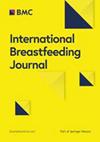乌干达恩桑比亚圣弗朗西斯医院产后母亲对捐赠母乳的接受程度:一项混合方法研究
IF 2.9
2区 医学
Q1 OBSTETRICS & GYNECOLOGY
引用次数: 0
摘要
世界卫生组织建议,对于暂时无法提供足够母乳以满足婴儿需求的母亲来说,使用捐赠的母乳(HM)是第二好的选择。然而,在乌干达,捐赠人乳尚未被接受。我们评估了恩桑比亚圣弗朗西斯医院(SFHN)产后母亲对捐赠母乳的接受程度及其相关因素。我们在 2018 年 10 月至 2019 年 3 月期间开展了一项横断面顺序解释混合方法研究。对圣弗朗西斯医院的410名产后母亲进行了关于社会人口学、捐献HM的认知度和可能接受度的问卷调查。进行了多变量逻辑回归分析,以确定接受 HM 捐赠的相关因素。焦点小组讨论(4)和关键信息提供者访谈(4)被用来探讨影响捐赠母乳行为的因素。定性数据采用内容主题方法进行分析。捐献人乳的总体接受度为 77.6%,重要因素包括:表达人乳的意愿(AOR 7.5;95% CI 3.01,18.68);湿护理知识(AOR 2.3;95% CI 1.1,5.0)和到五岁以下儿童诊所就诊(AOR 21.3;95% CI 2.3,196.9)。与接受捐献胎膜有关的主要主题是湿润护理经验、对捐献胎膜的信心以及对其有效性的认识。有人担心母乳是否安全和充足,以及害怕通过母乳传播犯罪行为和精神疾病。圣弗朗西斯医院(St. Francis Hospital Nsambya)的产后母亲对捐献母乳的接受度非常高。愿意挤出并储存母乳、事先了解湿法哺乳知识以及到五岁以下儿童门诊就诊都与接受捐赠有关。因此,在研究环境中建立母乳库是可行的。本文章由计算机程序翻译,如有差异,请以英文原文为准。
Acceptability to donate human milk among postnatal mothers at St. Francis hospital Nsambya, Uganda: a mixed method study
The World Health Organization recommends the use of donated human milk (HM) as the second-best option for mothers who are temporarily unable to provide sufficient breast milk to meet the needs of their infants. However, HM donation is yet to become an accepted practice in Uganda. We assessed the level of, and factors associated with acceptability to donate HM among postnatal mothers at St. Francis Hospital Nsambya (SFHN). A cross-sectional sequential explanatory mixed method study was conducted between October 2018 and March 2019. A questionnaire on sociodemography, awareness and likely acceptability to donate HM was administered to 410 postnatal mothers at SFHN. Multivariate logistic regression analysis was undertaken to determine factors associated with acceptance of HM donation. Focus Group Discussions (4) and Key Informants Interviews (4) were used to explore factors influencing behaviours to donate human milk. Qualitative data were analysed using a content thematic approach. Overall acceptance of donating the HM was 77.6%, and the significant factors were: willingness to express the HM (AOR 7.5; 95% CI 3.01, 18.68); wet-nursing knowledge (AOR 2.3; 95% CI 1.1, 5.0) and visit to under-5 years’ clinic (AOR 21.3; 95% CI 2.3, 196.9). The major themes in relation to accepting to donate HM were wet nursing experience, and confidence in donating the HM, and its perceived effectiveness. There were concerns about the safety and adequacy of HM and fear of transmitting criminal behaviours and mental illness through human milk. Acceptance to donate HM among postnatal mothers at St. Francis Hospital Nsambya was very high. Willingness to express and store human milk, prior knowledge about wet nursing and a visit to an under-five outpatient clinic were associated with acceptance. Thus, establishing a human milk bank is feasible in the study setting.
求助全文
通过发布文献求助,成功后即可免费获取论文全文。
去求助
来源期刊

International Breastfeeding Journal
Medicine-Obstetrics and Gynecology
CiteScore
6.30
自引率
11.40%
发文量
76
审稿时长
32 weeks
期刊介绍:
Breastfeeding is recognized as an important public health issue with enormous social and economic implications. Infants who do not receive breast milk are likely to experience poorer health outcomes than breastfed infants; mothers who do not breastfeed increase their own health risks.
Publications on the topic of breastfeeding are wide ranging. Articles about breastfeeding are currently published journals focused on nursing, midwifery, paediatric, obstetric, family medicine, public health, immunology, physiology, sociology and many other topics. In addition, electronic publishing allows fast publication time for authors and Open Access ensures the journal is easily accessible to readers.
 求助内容:
求助内容: 应助结果提醒方式:
应助结果提醒方式:


